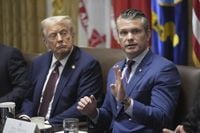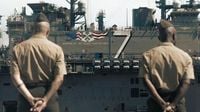The southern Caribbean is witnessing a dramatic escalation in military activity as the United States, under the Trump administration, ramps up its fight against powerful Latin American drug cartels. In a move that has sent ripples through regional politics, the US has deployed a formidable naval force—unprecedented in size for the area—aiming to dismantle what it calls a "narco-terrorist" threat emanating from Venezuela and Mexico. This surge, involving warships, submarines, and thousands of American troops, has drawn both praise and fierce criticism from leaders across the Caribbean and South America.
On August 25, 2025, US Secretary of State Marco Rubio, speaking at a Cabinet meeting in Washington, hailed Trinidad and Tobago as a key ally in the US campaign against drug cartels. According to Guardian Media, Rubio told President Trump, “For the first time in the modern era, we are truly on offence against organised cartels that are pumping poison, killer poison, into our cities.” This statement marked a pivotal moment in the US’s approach to the region, signaling a shift from defensive posturing to direct action against criminal organizations.
The US Navy’s presence in the southern Caribbean has grown rapidly. Where once only two or three American warships and Coast Guard cutters patrolled these waters, the deployment now includes an amphibious group centered on the USS Iwo Jima. As reported by The Economist, this group consists of three ships carrying 4,500 sailors and marines. The force is further bolstered by the arrival of the USS San Antonio and USS Fort Lauderdale, as well as the imminent arrival of the USS Lake Erie—a guided missile cruiser—and the USS Newport News, a nuclear-powered submarine. Reconnaissance planes and an additional nuclear-powered attack submarine have also been shifted to the region, making this one of the largest US naval operations in the Caribbean in recent memory.
According to NewsNation, these ships began arriving in the region on August 24, 2025, with additional vessels expected by early the following week. The Pentagon has not specified the exact roles of these ships or the troops on board, but officials maintain that the mission is focused squarely on combating drug cartels, not on waging war against Venezuela itself. Pentagon spokesperson Sean Parnell described the operation as requiring a “whole-of-government effort,” emphasizing that the Department of Defense “will undoubtedly play an important role” in President Trump’s objective to eliminate the cartels’ ability to threaten US safety and security.
The Trump administration has accused Venezuelan President Nicolás Maduro of “narco-terrorism”—a charge that has been met with outrage in Caracas. In response to the US naval buildup, Maduro has condemned the deployment as a violation of Venezuelan sovereignty and a direct threat to regional stability. According to NewsNation, Maduro has announced the deployment of 15,000 Venezuelan troops to the border with Colombia, backed by boats, aircraft, and drones, and has called on Colombian authorities to do the same to maintain peace in the area. Maduro, appearing on state television, accused Washington of fueling a dangerous escalation in the region.
The US has not limited its accusations to Maduro alone. The Trump administration recently designated both the Cartel de los Soles—a powerful Venezuelan criminal organization—and other Latin American cartels as foreign terrorist organizations. The US Department of Justice has seized more than $700 million in assets linked to Maduro and his associates, including private jets and vehicles. Attorney General Pam Bondi stated, “Maduro uses foreign terrorist organizations like Tren de Aragua, the Sinaloa cartel and Cartel de los Soles—also known as the Cartel of the Suns—to bring deadly drugs and violence into the United States.” Bondi further revealed that the DEA has linked 30 tons of cocaine to Maduro and his associates, with nearly seven tons tied directly to Maduro himself. The US has announced a $50 million reward for information leading to Maduro’s arrest on drug charges.
Secretary of State Rubio has made it clear that the US does not recognize the Maduro regime as legitimate. At the same Cabinet meeting, Rubio noted the formation of an international coalition to tackle the regional drug crisis, stating, “Countries just in the last week, Ecuador, Paraguay, Guyana, Trinidad, today Argentina, all joining us or trying to be helpful in advancing this.” This coalition-building effort is seen as a key component of the US strategy, aiming to unite regional allies against what Rubio called “the scourge on the international stage.”
Support for the US-led operation has not been universal, but it is significant. Trinidad and Tobago’s Prime Minister Kamla Persad-Bissessar has publicly declared her government’s full support for the US deployment. As reported by Guardian Media, Persad-Bissessar stated, “The truth is the Caribbean is already on fire, engulfed by the flames of illicit drug, gun and arms trafficking.” She dismissed concerns from the opposition and regional organizations, arguing that partnering with America is necessary to defend—not undermine—the Caribbean. Guyana has also voiced its backing, supporting “concerted efforts at the national, regional, hemispheric and global levels” to combat international crime, specifically referencing the Cartel de los Soles.
Despite these endorsements, the operation has sparked heated debate. Critics, including the Venezuelan government, argue that the US show of force is less about drug interdiction and more about regime change in Venezuela. The Trump administration, for its part, insists the focus is on cutting off the flow of drugs into the US and bringing those responsible to justice. White House spokesperson Karoline Leavitt told reporters, “He’s prepared to use every element of American power to stop drugs from flooding into our country and to bring those responsible to justice.”
The legal and political ramifications of the deployment are still unfolding. Earlier in August, President Trump reportedly signed a secret directive authorizing the Pentagon to use military force against certain Latin American drug cartels, as detailed by The New York Times. This move has prompted questions about the potential for civilian casualties and the legal status of any deaths resulting from US military action. US officials have so far declined to provide specifics on rules of engagement or the scope of the mission, fueling speculation about possible escalation.
As more ships and troops arrive in the Caribbean, the region stands at a crossroads. The US-led coalition is determined to disrupt the vast and violent networks that traffic drugs northward, while Venezuela and its allies warn of the dangers of foreign military intervention. With tensions high and the stakes enormous, the coming weeks will likely determine whether this surge marks a turning point in the battle against the cartels—or the start of a new and riskier phase in Caribbean geopolitics.


